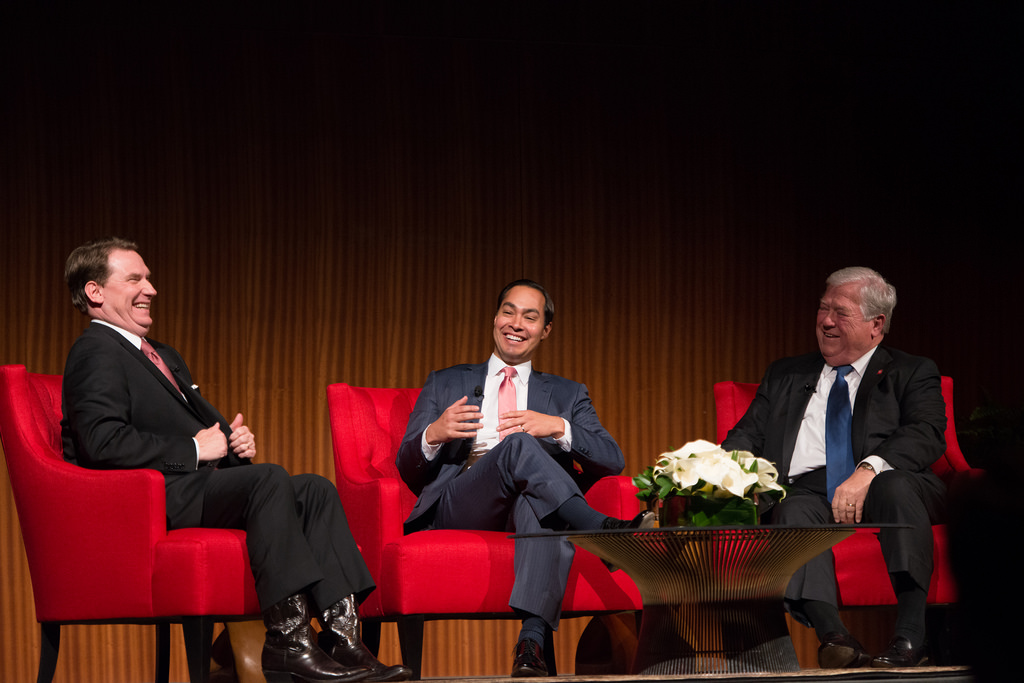The recent Civil Rights Summit at the LBJ Library looked back on the actions of courageous individuals who made tremendous sacrifices in order to extend the promises of the American Dream to all citizens. Today we are reminded that despite many victories, the struggle for civil rights continues in today’s immigration debate.
The summit’s second panel “Immigration: Pathway to the American Dream,” provided little more stale political rhetoric from San Antonio mayor Julian Castro and former governor of Mississippi, Haley Barbour. During the debate, a young undocumented activist yelled out and challenged Castro to confront the elephant in the room: Obama’s deportation policy. Meanwhile, outside the LBJ library, several students chained themselves to a statue of Martin Luther King, as they chanted “Deporter in Chief.” Invoking the spirit and symbolism of Civil Rights, students handcuffed themselves to protest injustice. The demonstrators in Austin are not alone. Dozens of immigrant activists throughout the country are continuing hunger strikes to bring awareness to the broken immigration system.
The legal immigration system in the U.S. is outdated and cannot adequately handle the flow of migrants from family-based petitions, skilled workers, to seasonal farmers. This systemic failure has resulted in a population of roughly 11 million undocumented individuals who find themselves in legal purgatory en route to their American Dream. Over 40% of these individuals have U.S. citizen children or spouses. In these circumstances, deportations harm not only immigrants, but have often separated American children from their parents.
Despite being widely regarded as a champion of immigrants’ rights, the Obama administration has deported over 2 million undocumented individuals, more than any other president. Only 394,000 of those deported, representing roughly 20%, were guilty of serious crimes including drug related offenses.
The increase in deportations can be attributed to the expansion of Secure Communities in 2011. This policy provided local law enforcement with the ability to turn over non-citizens to Immigration Control and Enforcement (ICE) on a detainer for deportation proceedings. According to ACLU, these measures have resulted in wrongful imprisonment of U.S. citizens and permanent residents – Latinos in particular. As a result, communities are being pulled apart due to distrust for law enforcement, which in the end, has the effect of increasing insecurity.
Last spring, the Senate passed bipartisan bill S.744 which provides a pathway to citizenship for undocumented residents as part of a comprehensive solution to the immigration issue. Unfortunately, one year later bring us no closer to any meaningful reform, but the sense of urgency increases as more and more families are torn apart by deportations. Many states and local governments have taken initiative over the lack of federal actions. Some of these measures include the draconian anti-immigration laws of Arizona and Alabama, where state law enforcement officers are authorized to question anyone’s immigration status. On the flip side, Baltimore, Maryland and counties in Oregon, have enforced policies to reduce detainment of undocumented immigrants.
The Civil Rights Summit ended with President Obama’s keynote and he reminded us: “Still, the story of America is a story of progress… and that’s true because of men like President Lyndon Baines Johnson.”
The U.S. needs real progress on immigration reform. We need immigration reform to help our economic recovery. We need immigration reform to restore trust in local law enforcement and secure our communities. And finally, we need immigration reform to restore dignity and stand up for the rights of all individuals in this country.
The struggles of the Civil Rights movement are alive and more relevant than ever in our struggle for a just immigration system. It is time for our leaders to follow the example of LBJ and take action and pass comprehensive immigration reform.
The house of representatives has recently introduced their own comprehensive reform bill, however it has yet to be brought to the floor for a vote.
Sign this petition and make your voice heard to remind our leaders that immigration reform is long overdue.
Tawheeda Wahabzada, Nikolai Druzhinin and Olivier Beaufils are graduate students in Global Policy Studies at UT-Austin’s Lyndon B. Johnson School of Public Affairs

